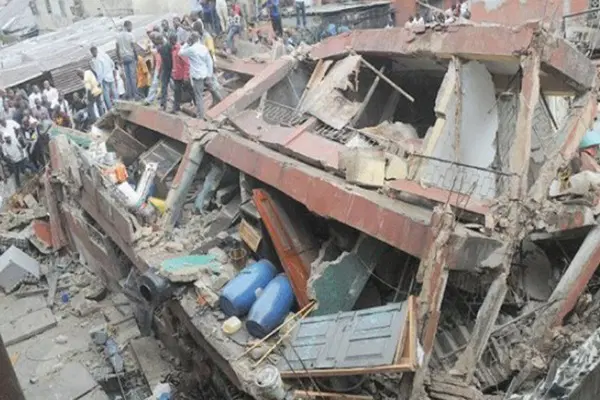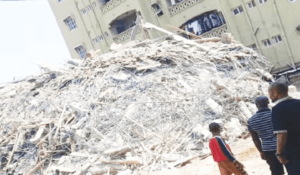The Federal Ministry of Housing and Urban Development has expressed grave concern over the growing issue of building collapses across the country, warning that punitive measures will be applied to defaulters who violate building codes.
The Director of Planning Research and Statistics at the Ministry, Mohammed Bala, made the announcement on Monday, stating that efforts were underway to mitigate the effects of such incidents.
Speaking in Gombe during the opening of a five-day meeting of the National Council on Lands, Housing and Urban Development, Bala emphasized the need to address the issue of building collapse, noting the severe consequences for lives and property.
Bala explained, “The council is the highest body in policy-making for the lands, housing and urban development. We had asked for memos to be submitted around three months ago on concerns around housing development in the country. Over 60 organisations responded to the various topics on the themes we forwarded to provide inputs into how to resolve or improve the issue of the housing sector.”
Reflecting on the serious impact of building collapses, Bala said, “Building collapse is not only about the house but about the lives of the people. If you care about the lives of the people, you must consider the issue of collapse. I have never seen instances where buildings collapse and you don’t lose property and lives, or people sustaining injuries.”
He further added, “The problem of building collapse is a very serious issue. Mr. President has seriously challenged the issue of building collapse, the Minister of Housing and Urban Development, Ahmed Musa Dangiwa, even set up a committee on the issue of building code.”
Bala also revealed that experts had been invited to the ongoing meeting to present on building collapse, with a special focus on improving policies and enforcement around construction standards.
“They have made presentations and you have seen in our programme that we have two sessions where issues of building collapse would be discussed. Experts have been invited to make presentations on that issue. It will be deliberated, discussed and reviewed and policies will be taken that will take effect in the entire country.”
The frequency of building collapses has become a major concern for the government, with Bala noting that several incidents had been reported in 2023 and 2024 in major cities like Jos, Lagos, and Abuja.
“In 2023, and 2024 we had the one in Jos, Lagos, and Abuja. Many buildings collapsed in the period. The one reported by the media is the one we know, but it’s happening every day, resulting from natural causes, non-adherence to building codes, and the use of substandard products.”
READ ALSO: Delta Approves N936 Billion Budget Proposal for 2025 Fiscal Year
The Ministry’s plan to combat this issue also involves increased sanctions for offenders. Bala explained, “The minister has been emphasising sanctions in every meeting. Recently, the tribunal for this housing was inaugurated and he said there should not be undue consideration, anyone who violates any code, or law should be sanctioned.”
At the same meeting, the Gombe State Commissioner for Works, Housing and Transportation, Dr. Usman Kallamu, highlighted the importance of affordable housing in fostering economic growth. “It is pertinent to note that our collective goal is to provide opportunity for every individual to have access to safe, decent and affordable housing.”
Kallamu also spoke about the state’s efforts to align with the Federal Government’s Renewed Hope housing agenda, noting that Gombe State had allocated substantial funds in the 2024 budget for infrastructural development, particularly in the housing sector.
“Gombe allocated a huge amount of money for infrastructural development in the 2024 budget, especially in housing units through separate partnerships with the North-East Development Commission and the Family Home Funds Limited.”
Meanwhile, the Federal Government continues to urge stakeholders in the building and construction industry to collaborate in finding lasting solutions to building collapses.
At a national conference on the Building/Construction Sector, Minister of State for Industry, Trade, and Investment, John Enoh, emphasized the need for strict adherence to standards. “I am aware of the several efforts by some on this matter. My mandate to you on this crucial matter is to ensure safer, more reliable structures. This forum affords me a chance to relate with relevant stakeholders in the industry and to unite and collaborate for the common purpose of safety.”
Enoh encouraged stakeholders to focus on improving regulatory frameworks throughout the construction process, stating, “In the discussion here, I’d like to encourage everyone to focus more on the areas of pre-construction, construction, and post-construction regulatory and enforcement framework in the promotion of public awareness, as well as capacity building enhancement.”
The Minister further reiterated that the current administration prioritizes public safety, stressing that ending the epidemic of building collapses is crucial to the country’s development.
“The current administration is concerned about the security of lives and property. It’s uppermost on the agenda of the current administration. So putting a stop to the unending incidents of building and construction collapses is paramount.”
Additionally, the Director-General of the Standard Organisation of Nigeria (SON), Dr. Ifeanyi Okeke, identified regulatory gaps as a key cause of the building collapse crisis, rather than substandard materials, which are often blamed.
“Three months ago, this idea came to me after a series of building collapses in the country. In all of the incidents with building collapse, SON visits the scene to take samples, and after taking samples, we found out that it is not a result of sub-standard products, but there is a gap in terms of regulations.”
Dr. Okeke further explained that many incidents occurred due to unauthorized building practices, such as construction on existing structures without the necessary approvals.
“In the incidents in Jos and other places, we found out people were building on existing structures without approvals from the required agency that should have given them the approval. So what we did is to close the gap and make sure that regulations. So it’s important to bring all stakeholders to discuss this issue and fashion a way out.”
Okeke also noted that despite ongoing efforts by SON to raise awareness, many industry professionals still lack knowledge of essential building standards. “We observed that despite many sensitisation and awareness campaigns carried out by SON over the years, many industry stakeholders and practitioners still lack awareness of the standards required for safe, durable, and sustainable buildings.”
The Federal Government remains focused on tightening regulations and enhancing enforcement mechanisms to prevent further loss of life and property due to building collapses. As stakeholders continue to collaborate, the hope is to establish more effective standards and regulations to ensure safer construction practices across the country.


